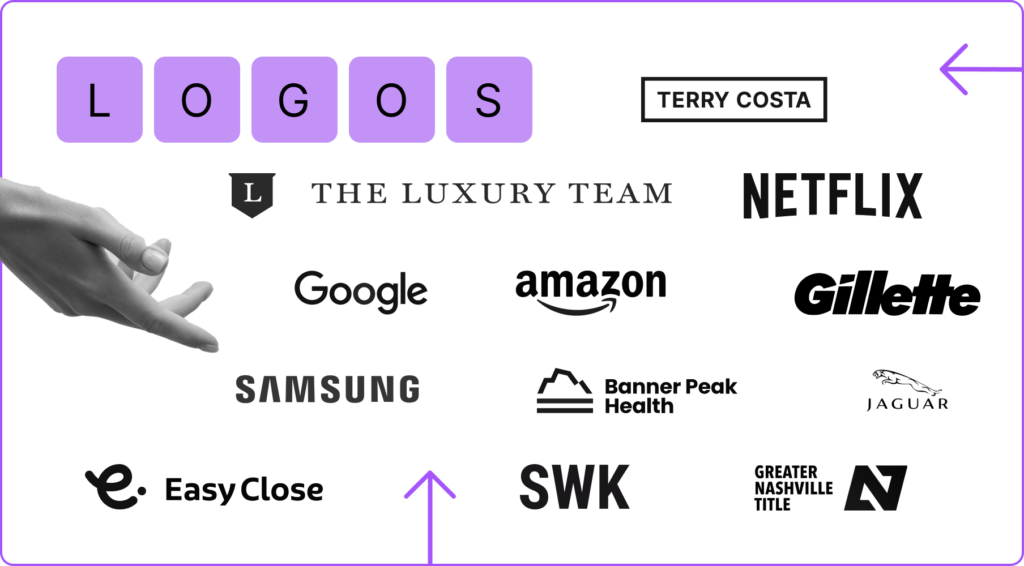Have you ever wondered why specific brand names stick in your mind while others fade away? That’s the magic of a great brand name. It’s not just a label; it’s the heart and soul of your business, the first thing people notice and remember. Let’s highlight what makes a brand name so important and find some cool stories behind the names of some of the biggest brands.
What is a Brand Name?

A brand name is more than just words. It’s the unique identity of your business or product, the first impression you make on potential customers. Think of it as the flag you wave in the marketplace, letting everyone know who you are and what you stand for.
Why is a Good Brand Name Important?
A good brand name is like a magnet – it draws people in and keeps them returning. It helps your customers remember you, understand what you offer, and feel a connection to your brand. A memorable name sets you apart and builds loyalty in a world of choices.
Cool Stories Behind Famous Brand Names
Even the most prominent brands started small, often with exciting stories behind their names. Here are a couple of favorites:
- Amazon: Did you know Amazon was almost called “Cadabra”? Jeff Bezos wanted a magical name, but when “Cadabra” was often misheard as “Cadaver,” he changed it. He chose “Amazon” to reflect the vastness of his vision, just like the Amazon River.
- Apple: The story goes that Steve Jobs, while on a fruit diet, came up with the name “Apple.” It was simple and fun, placing his company ahead of Atari alphabetically—a smart move for visibility in those early directory days.
Making Your Brand Name Memorable
Creating a good brand name is a mix of art and strategy. It must be catchy, easy to pronounce, and resonate with your target audience. When done right, it’s a powerful tool that can set you apart from the competition and build a solid emotional connection with your customers.
Examples of Successful Brand Naming
- Nike: Named after the Greek goddess of victory, Nike is an inspiring and memorable brand that perfectly captures the spirit of athletics and competition.
- Tesla: Named after the inventor Nikola Tesla, the company’s name reflects innovation and advanced technology, aligning perfectly with its mission to accelerate the world’s transition to sustainable energy.
“Your brand is the single most important investment you can make in your business.” – Steve Forbes, Editor in Chief, Forbes Magazine.
Key Facts About Brand Names
- The name “Lego” comes from the Danish word “leg godt,” meaning “play well.”
- Pepsi’s logo colors are red, white, and blue, representing support for American troops during World War II.
- Blue is the most popular color used in branding, symbolizing trust and reliability.
To develop a marketing strategy, we must start with a clear understanding of our target audience. This includes creating buyer personas, identifying key pain points and challenges, and understanding the buying journey of our customers.
What is the Purpose of a Brand Name?
A brand name is the heartbeat of a business, setting it apart in a crowded marketplace. But why are brand names so important? Let’s break it down.
Identification and Recognition
A brand name is a unique signature that helps customers identify and remember a business. In a world of options, a standout name makes your brand more accessible to pick from the crowd.
Influence on Decisions
A strong brand name doesn’t just help with recognition; it can influence decisions. Whether a customer buys a product or an intern chooses to stay with a company, a compelling name builds trust and loyalty.
Simplicity and Success
Some of the most successful brand names are surprisingly simple. Even quirky names can become hits if they capture the essence of the company’s values and mission. They’re easy to remember, catchy, and meaningful.
Representation of Values
A brand name should tell a story and reflect the company’s core values. It doesn’t matter if the name is a bit unusual-as long as it’s easy to spell and aligns with the company’s goals. Language is powerful, and a brand name is the first chance to use this power effectively.
Emotional Connection
A good brand name creates an emotional connection. Take Patagonia, for example. The name evokes feelings of adventure, sustainability, and environmental consciousness. Customers connect more deeply with brands they feel emotionally attached to. On the other hand, poorly chosen names can fail, like Microsoft’s “Microsoft Bob,” which didn’t appeal to consumers.
Strategic Alignment
Naming a brand requires strategic thinking. The name should align with the brand’s overall strategy, be clear and memorable, and evoke the right emotions. A strong brand name is a long-term asset that contributes to brand equity.
Emotional Evocation
Names can stir emotions, and businesses can use this to their advantage. Disney’s name brings nostalgia and magic, while SpaceX suggests innovation and exploration. Understanding your audience and choosing a name that resonates emotionally can significantly boost your brand’s success.
That means a brand name is more than just a label. It’s a critical part of a company’s identity that influences recognition, emotional connection, and overall success. So remember, a great brand name is the heartbeat of your business.
Top Tips to Perfect Brand Name
Creating a standout brand name is crucial for your business’s identity and success. Let’s walk through the steps together in a way that makes it clear and exciting.
1. Brainstorm: Define Your Identity
First things first: what’s your brand all about? Your name should reflect your brand’s essence and goals. So, gather your team and stakeholders to set clear objectives. Are you aiming for a name that screams innovation, reliability, or fun? Figure out what you want people to feel when they hear your brand name.
To nail this down:
- Brand Purpose and Vision: Why does your brand exist, and where do you see it heading?
- Brand Values and Personality: What principles guide your business? And how you want customers to perceive you.
If you’re launching a plant-based skincare line, your purpose might be to promote natural beauty. You might also envision becoming a leader in eco-friendly skincare. Your values could include sustainability, health, and transparency.
And remember your market! Understanding your audience—whether health-conscious millennials or eco-aware boomers—will help shape the language and tone of your name.
2. Make It Memorable and Unique
The fun part is brainstorming names! Consider different approaches to make your brand name pop:
- Made-up Names: Think “Kleenex” -unique, easy to remember, and has a pleasant sound.
- Result-oriented Names: Like “QuickFix,” showing what you deliver, perfect for a tech repair service.
- Metaphorical Names: Take “Puma,” a strong, fast animal that is great for a sportswear brand.
- Transparent Names: Straightforward, like “MinuteClinic,” a name that immediately tells you it’s a healthcare provider.
- Two-in-One Names: Blend words, e.g., “Snapchat,” combining “snap” and “chat” for a fun social media app.
- Founder’s Names: Like “Levi’s,” it is named after the founder, Levi Strauss.
- Foreign Language Names: Borrow elegance, like “L’Oreal,” which suggests luxury and style.
- Abbreviated Names: Short and sweet, such as “BMW” (Bayerische Motoren Werke).
- Leadership Names: Assert dominance, like “Supreme,” suggesting top-notch quality and exclusivity.
- No Hidden Meaning Names: Simple yet catchy, like “Yahoo” – it doesn’t directly reference search engines but is fun and memorable.
Test these names! Polls, logo designs, and ad campaigns can help you gauge which names resonate best.
Factors that make a memorable brand name:
- Meaning: The name should convey something about your brand.
- Emotions: It should evoke feelings that align with your brand’s message.
Things to avoid:
- Complex spellings.
- Generic or overly descriptive names.
- Names that are too similar to competitors.
3. Check Availability
Before you fall in love with a name, make sure it’s logically and digitally available:
- Trademark Search: Ensure your name isn’t already taken.
- Domain Name Search: Secure a matching domain.
- Social Media Handles: Grab consistent usernames across platforms.
Thinking global? Check international trademark databases to cover your bases.
For instance, if you’re considering the name “GreenGlow” for your skincare brand, you’ll need to ensure that no one else in the beauty industry is using it and that you can get the domain “greenglow.com.”
4. Test Your Ideas
You’ve got a shortlist – now put them to the test:
- Qualitative Research: Get feedback through surveys and focus groups.
- Quantitative Analysis: Use data to measure appeal and clarity.
- Cross-Cultural Evaluation: Ensure names translate well globally.
Refine your options based on feedback. Sometimes, a tweak in spelling or tone can make all the difference.
If “GreenGlow” gets mixed reviews, but “EcoRadiance” resonates well with your target audience, you might choose the latter.
5. Secure Social Media Accounts
Lock down your digital presence:
- Claim Handles: Reserve your brand name across all major social platforms.
- Monitor Mentions: Use tools to track how people talk about your brand online.
Integrate your brand name seamlessly into your website, marketing materials, and customer interactions. Consistency builds brand recognition and trust.
If you settle on “EcoRadiance,” grab @ecoradiance on Twitter, Instagram, Facebook, and any other platforms your audience frequents.
Creating a brand name isn’t just about picking something catchy; it’s about crafting an identity that resonates with your target audience and stands the test of time. So, get creative, do your research, and soon, your brand will have a name that’s as unique as it is memorable.
Launch Your Brand Today
Choosing the right brand name is no walk in the park. It’s not just about picking something that sounds cool – it’s about finding a name that captures your brand’s essence, resonates with your target audience, and stands out in a crowded market. Without a solid and memorable brand name, you risk missing your shot at making a lasting impression.
A weak brand name can make you blend into another brand with more substantial authority, hence into the background, confuse potential customers, or be forgotten altogether. The pressure is high, and the stakes are even higher. You’ll have to deal with trademark issues, ensure cultural sensitivity, and differentiate yourself from competitors. It is quite overwhelming!
But here’s the good news – you can tackle it with Project Branding. Our expertise in the brand naming process can help you avoid these pitfalls and set your business up for success. We understand the intricacies and can guide you through the process, ensuring your brand name captures your unique identity and connects with your audience deeply and meaningfully.Don’t leave this crucial decision to chance. Work with us to craft a brand name to make a powerful and lasting impact. Reach out today, and let’s start creating a name that sets you apart and positions you for success.



